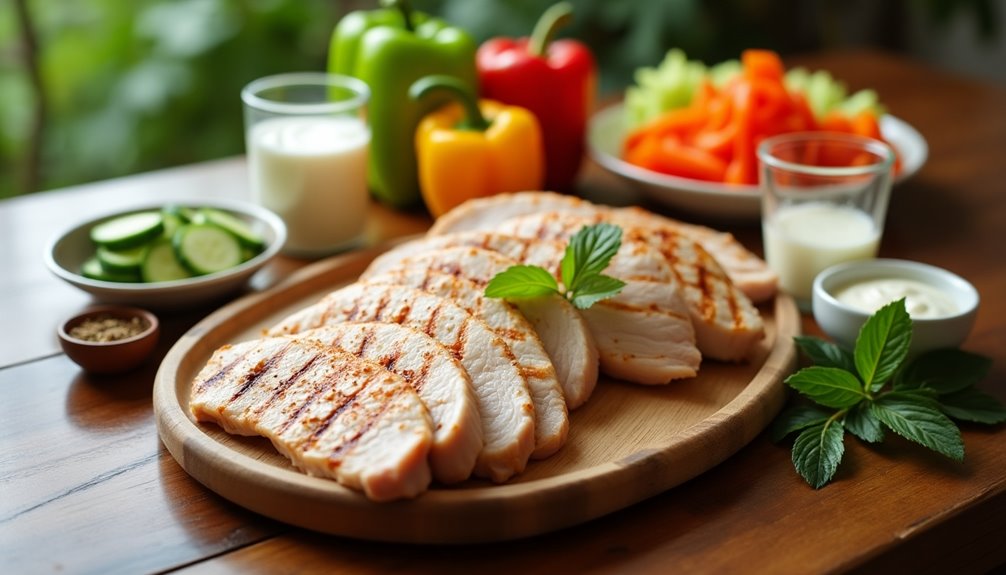The Dukan Diet is a high-protein, low-carb plan designed by Dr. Pierre Dukan to promote weight loss through four phases: Attack, Cruise, Consolidation, and Preventive. It emphasizes lean proteins like chicken and fish while limiting carbs and starchy vegetables. Many find rapid weight loss appealing, but there can be challenges, such as potential nutritional deficiencies and sustainability issues. Proper meal planning is essential for success, focusing on staying hydrated and incorporating non-starchy vegetables. If you're curious about how to navigate these phases effectively and maximize your results, you might uncover some useful tips along the way.
Key Takeaways
- The Dukan Diet is a high-protein, low-carb diet designed by Dr. Pierre Dukan to promote weight loss through four distinct phases.
- It includes lean proteins, low-fat dairy, and eggs while avoiding high-carb foods like bread, fruits, and starchy vegetables.
- The diet encourages meal planning to maintain structure and promote satiety, aiding in sustainable weight loss.
- Benefits include rapid initial weight loss and healthy eating habits, but challenges may arise, such as nutritional deficiencies and weight regain.
- Joining support groups and considering plant-based options can enhance the Dukan Diet experience and promote long-term health.
Overview of the Dukan Diet

The Dukan Diet is a high-protein, low-carbohydrate weight loss plan developed by French physician Dr. Pierre Dukan. This diet highlights lean proteins while reducing carbohydrate intake significantly, appealing to those aiming to drop pounds rapidly and efficiently. By giving priority to high-protein foods, you may experience increased satisfaction, which can assist you in resisting cravings and continuing your weight loss journey.
One of the main principles of the Dukan Diet is that protein consumption can lead to a metabolic boost. This implies your body might burn more calories while processing protein, a process known as the thermic effect of food. As you follow this diet, you'll find yourself enjoying a variety of protein sources, including lean meats, fish, eggs, and low-fat dairy products. These foods not only aid weight loss but also support muscle maintenance, essential for overall health. Recent research indicates that such a diet can also enhance metabolism, which may further contribute to weight loss success.
While the Dukan Diet has many followers who report successful weight loss, it's essential to approach it with care. Some nutritionists argue that a diet overly focused on protein can result in nutrient deficiencies and long-term health issues. Striking a balance is crucial, so consider incorporating a variety of vegetables and healthy fats into your meals.
Ultimately, if you're seeking a structured plan that highlights high protein and rapid weight loss, the Dukan Diet could be worth exploring. Just remember to listen to your body and consult a healthcare professional for personalized advice.
The Four Phases Explained

Understanding the Dukan Diet's structure is crucial to its effectiveness, as it consists of four distinct phases that guide you through the weight loss process. Each phase has a specific purpose and progression, making meal planning an essential component of your journey.
The first stage, Attack, is a short but intense period focusing on high-protein foods. You'll consume lean meats, fish, and dairy, allowing your body to enter ketosis, which can kickstart your weight loss. This phase typically lasts 2-7 days, depending on your goal.
Next is the Cruise phase, where you alternate between pure protein days and days with non-starchy vegetables. This phase is designed to help you lose weight steadily while giving you more meal options. It lasts until you reach your target weight, so meal planning becomes essential to maintain variety without falling off track.
Once you've hit your goal, you move into the Consolidation phase. This phase prevents rebound weight gain by gradually reintroducing carbohydrates and fats. You'll enjoy fruits and whole grains while maintaining protein days, promoting a balanced approach to your diet. Additionally, having a custom keto diet plan can help you tailor your meals to your specific needs during this phase.
Benefits of the Dukan Diet

Starting on the Dukan Diet can offer several advantageous benefits that may make it an appealing choice for those looking to lose weight. One of the most significant advantages is its structured approach, which breaks the process into manageable phases. This can help you stay motivated and focused on your goals.
By emphasizing high-protein foods, the diet encourages satiety, meaning you might feel full longer and resist the urge to snack on unhealthy options.
Another benefit is that the Dukan Diet promotes healthy eating habits. You'll learn to prioritize lean proteins, which are essential for muscle maintenance and overall health. This focus on nutrient-dense foods can lead to better energy levels and improved well-being, making it easier to incorporate exercise into your routine.
The diet also encourages the consumption of whole foods, which can foster a sense of community as you share recipes and experiences with others following the Dukan Diet. This connection can enhance your motivation and support system, making your weight loss journey feel less isolating.
Additionally, many individuals report rapid initial weight loss, which can boost your confidence and commitment to the program. As you progress, you'll likely notice positive changes not just in your body but also in your mindset regarding food and healthy eating. Furthermore, embracing a structured dietary plan like the Dukan Diet can lead to increased energy metabolism, supporting sustained energy levels throughout your weight loss journey.
Potential Challenges and Risks

Starting on the Dukan Diet can pose several challenges and risks that you should consider before diving in. While the promise of weight loss can be enticing, it's important to think critically about how the diet might impact your overall health and nutritional balance.
Here are four potential challenges you may face:
- Nutritional Deficiencies: The diet heavily restricts certain food groups, which can lead to deficiencies in essential vitamins and minerals. This imbalance might leave you feeling fatigued or unwell.
- Sustainability: The strict phases of the Dukan Diet can be difficult to maintain long-term. You may find yourself feeling deprived, leading to cravings and potential binge eating.
- Digestive Issues: A high-protein diet can cause digestive discomfort for some individuals. Problems like constipation or bloating may arise, making your experience less enjoyable.
- Weight Regain: Many people experience initial weight loss but struggle to maintain it after switching back to regular eating. This yo-yo effect can be frustrating and demoralizing.
Additionally, the restrictive nature of the Dukan Diet may go against the body's natural survival instincts, potentially leading to rebound weight gain. While the Dukan Diet can offer rapid weight loss, it's important to evaluate whether it aligns with your lifestyle and health goals. Remember, a balanced approach to nutrition is key to sustainable weight loss and overall wellness. Before starting any diet, consider consulting with a healthcare professional to make sure it's the right fit for you.
Foods to Include and Avoid

When following the Dukan Diet, knowing which foods to include and avoid is essential for success. This diet primarily focuses on high protein intake while enforcing strict carbohydrate restrictions. By understanding the right foods, you can effectively navigate this weight loss journey.
Start with lean protein sources. Chicken, turkey, and fish are excellent choices, as they offer high protein with minimal fat. Low-fat dairy products like yogurt and cottage cheese also pack a protein punch while keeping calories in check. Eggs are another fantastic option, providing essential nutrients alongside protein. Incorporating these foods helps you feel full and satisfied, making it easier to stick to the diet.
On the flip side, you'll need to avoid high-carbohydrate foods. This means steering clear of bread, pasta, rice, and most fruits, especially those high in sugar. Starchy vegetables like potatoes and corn should also be limited. Instead, focus on non-starchy vegetables like leafy greens, cucumbers, and bell peppers, which provide essential vitamins and minerals without derailing your carbohydrate restrictions.
It's important to remember that the Dukan Diet is divided into phases, and your food choices may vary as you progress. Embracing these guidelines will foster a sense of belonging in your community of fellow dieters. By keeping your meals centered around protein-rich foods and adhering to carbohydrate restrictions, you're setting yourself up for successful and sustainable weight loss. Additionally, studies have shown that high protein intake can positively influence weight management and overall health.
Tips for Success on the Diet

Successfully navigating the Dukan Diet often demands strategic planning and dedication. To achieve lasting success, you'll need to stay organized and focused on your goals. Here are some vital tips to help you thrive on this journey:
- Meal Planning: Dedicate time each week to plan your meals. This keeps you prepared and reduces the temptation to stray from the diet. Create a shopping list based on your meal plans to make sure you have all the right ingredients on hand.
- Hunger Management: Pay close attention to your hunger cues. Incorporate high-protein foods, as they help keep you fuller for longer. Don't hesitate to snack on approved foods like lean meats or non-fat dairy if you feel hungry between meals.
- Stay Hydrated: Drinking plenty of water is essential for feeling satisfied and energized. Aim for at least 2 liters a day to help with digestion and reduce feelings of hunger.
- Support System: Surround yourself with like-minded individuals who understand your goals. Join online forums or local groups where you can share experiences, tips, and encouragement. Having a support network can make a significant impact on your motivation and commitment. Additionally, consider the benefits of plant-based diets as they promote longevity and overall health, which can complement your Dukan Diet journey.
Frequently Asked Questions
Can I Exercise While Following the Dukan Diet?
Absolutely, you can exercise while following any diet! In fact, incorporating exercise offers numerous benefits, like boosting metabolism and enhancing mood. To enhance your results, think about the best timing for your workouts.
For instance, exercising when you have more energy can lead to better performance. Just listen to your body and adjust your routine as needed. Remember, finding a balance between diet and exercise is key to achieving your health goals!
Is the Dukan Diet Suitable for Vegetarians?
If you're a vegetarian, the Dukan Diet might be challenging. It primarily emphasizes protein sources like meat and dairy, which can make meal planning tricky. While you can find plant-based proteins, such as legumes and tofu, they may not fit perfectly into the diet's framework.
You'll need to get creative with your meal planning to guarantee you meet your protein needs while adhering to the diet's guidelines. Consider consulting a nutritionist for tailored advice.
What Should I Do if I Plateau?
Imagine a mountain climber, reaching a plateau where the view seems stagnant. To move forward, you must adjust your path. Overcoming plateaus means reassessing your approach—try adjusting macros to create a new balance.
Incorporate more protein or healthy fats, and make sure you're staying active. Remember, each step is part of your journey. Stay connected with others facing similar challenges; together, you'll find motivation and support to ascend to new heights.
How Long Can I Stay on the Dukan Diet?
You should consider how long you can stay on a diet by evaluating its sustainability and long-term effects. While some people may find short-term success, it's important to assess whether the diet fits your lifestyle and nutritional needs. Staying on a restrictive diet for too long can lead to nutritional deficiencies and unhealthy habits. Aim for a balanced approach that fosters a sense of belonging within a supportive community, focusing on lasting health.
Are There Any Age Restrictions for This Diet?
Imagine a garden where every age blooms differently. While the diet doesn't set strict age restrictions, it's wise to tread carefully.
For children, there are child restrictions; they need balanced nutrition for growth. Meanwhile, elderly individuals may face limitations due to health concerns, so consulting a healthcare provider is crucial.
It's about nurturing your unique needs and ensuring everyone can thrive together, no matter their age, in this journey of health and wellness.
Conclusion
In your journey with the Dukan Diet, remember that every path to wellness has its trials, much like Odysseus faced on his voyage. By embracing the structure of its four phases and staying mindful of your choices, you can navigate challenges and reap benefits. Stay focused on your goals, and don't forget to listen to your body. With determination and the right strategies, you can transform not just your diet, but your overall relationship with food.


